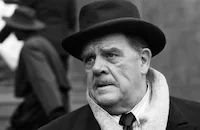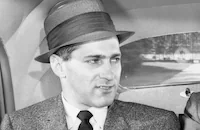Brewster's Millions
Brief Synopsis
Cast & Crew
Walter Hill
Richard Pryor
John Candy
Hume Cronyn
Lonette Mckee
Stephen Collins
Film Details
Technical Specs
Synopsis
A minor-league baseball player has thirty days to spend $30 million dollars in order to receive an inheritance of $300 million.
Director
Walter Hill
Cast

Richard Pryor

John Candy

Hume Cronyn

Lonette Mckee
Stephen Collins
Jerry Orbach

Pat Hingle
Tovah Feldshuh

Rick Moranis
Joe Grifasi
Candy Jennings
Richard Hochberg
Gloria Charles

Robert Ellenstein
Michael G. Hagerty
Allan Graf
Bennie Dobbins
Kip Waldo
Brad Sanders
Grand L Bush
Peter Jason
Allan Miller
David Wohl
Jeff Mylett
Yana Nirvana
Yakov Smirnoff
Ken Medlock
Regina Hooks
Conrad Janis
David White
Joel Weiss
Milt Kogan
Alan Autry
Malachy Mccourt
Margot Rose
R.d. Call
Archie Hahn
Strawn Bovee
Matt Landers
Gary Alexander
Ji-tu Cumbuka
Joseph G Medalis
Rosetta Lenoire
Jerome Dempsey
Carmine Caridi
Reni Santoni
William M. Mcconnell
Lin Shaye
Joey Banks
Frank Slaten
Robbie T Robinson
Ken Knighten
Art Reichle
Joseph Leon
Hank Robinson
Mike Paciorek
Kelly Yaegermann
Steve Benson
Wesley Thompson
Roger Til
Shaka Cumbuka
Crew
Cate Bangs
Joseph D Blair
Barbara Siebert Bolticoff
Bruce Botnick
Brian Callahan
Dick Colean
Stephanie Colin
Ry Cooder
Ry Cooder
Alice I Daniels
Carmel Davies
Freeman Davies
Bennie Dobbins
Raechel Donahue
John Dunn
Donald Flick
Stephen Hunter Flick
Michael Germain
Anthony Gibson
Richard Goddard
Larry Gordon
David W Gray
Terry Haggar
Ronald R Harris
Timothy Harris
Aubrey Head
Jim Henrikson
Bill Hiney
Hilda Hodges
Judith Holstra
Robert L Hoyt
Rob Hummel
Bonnie Koehler
David Kohan
Patti Labelle
Gene Levy
Gene Levy
Huey Lewis
Tony Lloyd
Greg Lowe
Beau E.l. Marks
Diane Marshall
George Barr Mccutcheon
Jackie Mcevoy
Vince Melandri
Paul Mooney
Dan Moore
T A Moore
Rick Neff
Emmitt-leon O'neill
Leroy Patton
Leroy Patton
Clay Pinney
Stephen Purvis
Michael Rauch
Michael Ripps
Marcia Ross
Larry Rovetti
Joel Silver
John J Stephens
Marjorie Stone
Amy Tebo
John C Vallone
Marilyn Vance-straker
Ric Waite
Ric Waite
James E Webb
Herschel Weingrod
Charles Wheeler
Linda Whittlesey
Mae Woods
Lisbeth Wynn-owen
Film Details
Technical Specs
Articles
Richard Pryor (1940-2005)
He was born Richard Thomas Pryor III on December 1, 1940 in Peoria, Illinois. By all accounts, his childhood was a difficult one. His mother was a prostitute and his grandmother ran a brothel. His father was rarely around and when he was, he would physically abuse him. From a young age, Pryor knew that humor was his weapon of choice to cut through all the swath he came across and would confront in his life.
After high school, he enlisted in the Army for a two-year stint (1958-60). When he was discharged (honorably!) he concentrated on stand-up comedy and worked in a series of nightclubs before relocating to New York City in 1963. In 1964, he made his television debut when he was given a slot on the variety program On Broadway Tonight. His routine, though hardly the groundbreaking material we would witness in later years, was very well received, and in the late '60s Pryor found more television work: Toast of the Town, The Wild Wild West, The Mod Squad ; and was cast in a two movies: The Busy Body (1967) with Sid Caesar; and Wild in the Streets (1968) a cartoonish political fantasy about the internment of all American citizens over 30.
Pryor's career really didn't ignite until the '70s. His stand up act became raunchier and more politically motivated as he touched on issued of race, failed relationships, drug addiction, and street crimes. His movie roles became far more captivating in the process: the piano man in Lady Sings the Blues (1972); as a wise-talking hustler in a pair of slick urban thrillers: The Mack (1973) and Uptown Saturday Night (1974); the gregarious Daddy Rich in Car Wash; his first pairing with Gene Wilder as Grover, the car thief who helps stops a runaway train in his first real box office smash Silver Streak (both 1976); and for many critics, his finest dramatic performance as a factory worker on the edge of depression in Paul Schrader's excellent working class drama Blue Collar (1978).
On a personal level, his drug dependency problem worsened, and on June 9, 1980, near tragedy struck when he caught fire while free-basing cocaine. Pryor later admitted that the incident, was, in fact, a suicide attempt, and that his management company created the lie for the press in hopes of protecting him. Fortunately, Pryor had three films in the can that all achieved some level of financial success soon after his setback: another pairing with Gene Wilder in the prison comedy Stir Crazy (1980); a blisteringly funny cameo as God who flips off Andy Kaufman in the warped religious satire In God We Tru$t (1980); an a ex-con helping a social worker (Cicely Tyson) with her foster charges in Bustin' Loose (1981). He capped his recovery with Live on the Sunset Strip (1982), a first-rate documentation of the comic's genius performed in front of a raucous live audience.
In 1983, Pryor signed a $40 million, five-year contract with Columbia Pictures. For many fans and critics, this was the beginning of his downslide. His next few films: The Toy, Superman III (both 1983), and Brewster's Millions (1985) were just tiresome, mediocre comedies. Jo Jo Dancer, Your Life is Calling (1986), was his only attempt at producing, directing, and acting, and the film, which was an ambitious autobiographical account of a his life and career, was a box-office disappointment. He spent the remainder of the '80s in middling fare: Condition Critical (1987), Moving; a third pairing with Gene Wilder in See No Evil, Hear No Evil; and his only teaming with Eddie Murphy in Harlem Nights (1989).
In 1986, Pryor was diagnosed with multiple sclerosis, a degenerative disease of the nervous system that curtailed both his personal appearances and his gift for physical comedy in his latter films. By the '90s, little was seen of Pryor, but in 1995, he made a courageous comeback on television when he guest starred on Chicago Hope as an embittered multiple sclerosis patient. His performance earned him an Emmy nomination and he was cast in a few more films: Mad Dog Time (1996), Lost Highway (1997), but his physical ailments prohibited him from performing on a regular basis. In 1998, The John F. Kennedy Center for the Performing Arts in Washington gave Pryor the first Mark Twain Prize for humor. It was fitting tribute for a man who had given so much honesty and innovation in the field of comedy. Pryor is survived by his wife, Jennifer Lee; his sons Richard and Steven; and daughters Elizabeth, Rain and Renee.
by Michael T. Toole

Richard Pryor (1940-2005)
Quotes
Trivia
Miscellaneous Notes
Released in United States Summer May 22, 1985
Released in United States on Video April 7, 1988
Released in United States 1983
This was the seventh filmed version of the novel and play, the most notable of which was the 1945 film of the same title starring Dennis O'Keefe and directed by Allan Dwan.
Began shooting April 30, 1984
Released in USA on laserdisc December 1988.
Released in United States Summer May 22, 1985
Released in United States on Video April 7, 1988
Released in United States 1983 (Shown at FILMEX: Los Angeles International Film Exposition (A "B-Movie" Marathon) April 13 - May 1, 1983.)













